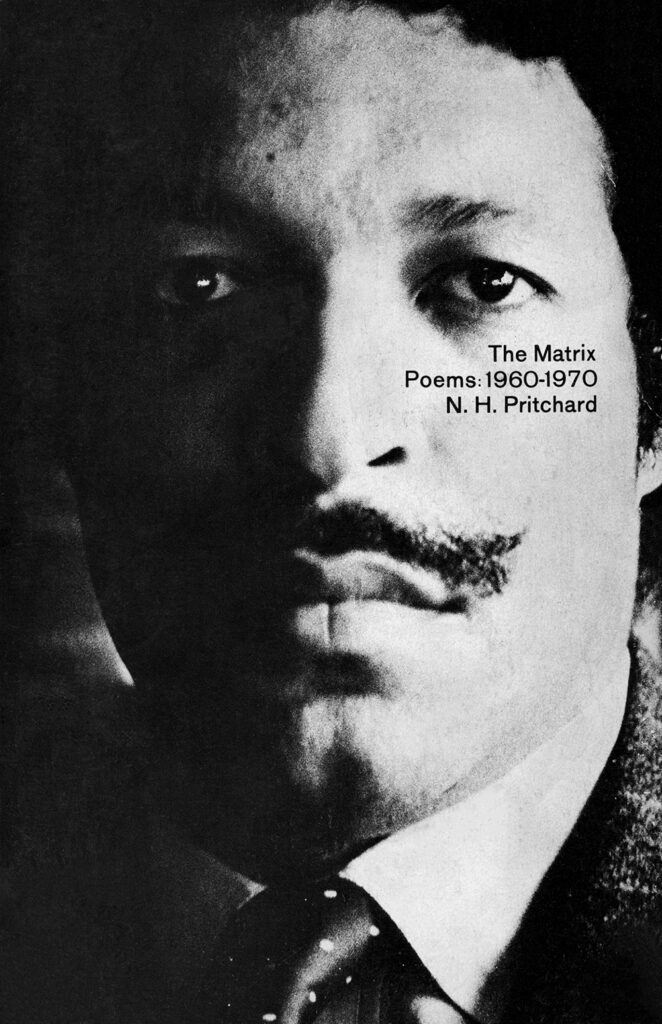SELF
What does the cracker
when in a barrel
bare
with dark
and alone
and
beside it
self
with fear
of being
uneaten

SELF
What does the cracker
when in a barrel
bare
with dark
and alone
and
beside it
self
with fear
of being
uneaten
Welcome to this 'huge/entering' of concrete breath—unprecedented, unsurpassed.
Fred Moten
Long out of print, Norman H. Pritchard’s masterwork presents a decade of poetic experimentation from 1960 to 1970. Inflected with—and perhaps an influence on—Black Arts, the precise architecture of Pritchard’s book (the poems and their design) stage an unexpected meeting of Concrete Poetry with Olson’s “open field” poetics and Cage’s chance operations. The seventy-one poems of Pritchard’s debut might be regarded, as Charles Bernstein has written, as “sound” poems tethered not only to the literature of the early Umbra group and the Black Arts Movement but also to jazz culture and urban life in New York. Drawing as much from the visual arts as from sound-based experimentation and music, Pritchard utilized the simple tools of spacing and typography to create syncopations, vibrations, and musical rhythms. What emerges is nothing less than a self-contained system of mimetic codes that challenge modernist modes of perception and representation. Formally innovative and anticipating what Michael Riffaterre would come to call the semiotics of “ungrammaticalities,” the book is a syntactical and visual experience in repetition, stutters, and structure.
This book is co-published with Primary Information, and is #35 in UDP’s Lost Literature series.
* For an additional $10, you can order The Matrix with a special tote bag featuring an excerpt from the book. Simply select the dropdown option at checkout.
Norman Henry Pritchard was born in New York City in 1939. He studied art and art history at New York University and Columbia University. He belonged to the Umbra group (1962–65), a collective of young black writers that included Steve Cannon, Thomas C. Dent, David Henderson, Calvin Hernton, Ishmael Reed, and Lorenzo Thomas. He published two collections: The Matrix, Poems: 1960–1970 (1970) and Eecchhooeess (1971), and his poems appeared in Umbra, The East Village Other, and other magazines and were anthologized in The New Black Poetry (1969) and In a Time of Revolution: Poems from Our Third World (1969). He also recorded his work for the Folkways compilation New Jazz Poets (1967). Pritchard taught poetry at the New School for Social Research and was a poet-in-residence at Friends Seminary. He died in eastern Pennsylvania on February 8, 1996.
Here’s a truth to which the black experiment is especially foregiven: “words are ancillary to content.” The converse is also true, indicating mutual aid and mutual trouble. When words and content get together, there’s enough room in the vast, infinitesimal blur not in between them for poetry to make its dispersive, displacing way. Norman H. Pritchard loves that non-Euclidean neighborhood. He keeps bullet time there, after hours, in a club, which is an open cell, called The Matrix. Welcome to this “huge/entering” of concrete breath—unprecedented, unsurpassed.
Fred Moten
Despite being published by no less a press than Doubleday, Pritchard's Matrix slipped too soon from view. In the ensuing years, finding a rare copy was like stumbling across a backdoor in the hyperlinking system allowing passage between our now and the then of Pritchard's Matrix, a then when major commercial houses would publish oracular, "experimental" verse. Like his book, Pritchard receded from view within the world of literary criticism, but his remarkable book persisted never-the-less. Here it is again, like an appearing-disappearing monolith in the desert, ominous and numinous at the same time.
Aldon Lynn Nielsen
These poems are “of our time” ... FREE souled ... elements of Gertrude Stein ... universal preoccupations four-squarely said.
Allen Ginsberg
There was nothing like N.H. Pritchard’s Matrix when it was first published in 1970 and there’s nothing like it now. This wild book of poems is instructive on the materiality of language—that its physicality can be stretched, and if that’s true so can meaning. One is forced into encounter with language that is at once artificial, constructed, and social. Matrix is playful, lyrical, leaping, experimental, and visual—a collage resembling the innovative nature of Black beingness itself. With this re-publication, I hope that Pritchard takes his rightful place as a forebearer in the radical Black imaginative tradition.
Dawn Lundy Martin
Language processed, compressed, exhausted, unknown. N. H. Pritchard recodes our reading.
Adam Pendleton
Cover to cover, this is an endlessly rewarding visual masterpiece. There are innumerable matrices for the eye and mind within The Matrix, one of the great works of postwar US literature—long overdue for republication.
Paul Stephens
Witness from an evacuated, but persistent, site of enunciation even more forcefully informs N. H. Pritchard’s work, which can seem like a form of ghostwriting: writing written for another, or writing that points to the effaced speaking subject. [...] For Pritchard, “words are ancillary to content”; that is, words (or something in the words) are vehicles to some more fundamental but ambiguous and ephemeral meaning related to the opacity of language and experience. [...] If concrete poetry generally works by canceling referentiality, Pritchard’s unsaying begins from solid ground that it decomposes. Pritchard uses concrete poetry’s generic cancellation of referentiality as a kind of lever on political notions of black concreteness and black genius, unsaying the very conditions that would authorize speech.
Anthony Reed, Freedom Time: The Poetics and Politics of Black Experimental Writing
ISBN: 978-1-734489-79-8
Trade Paperback
232 pp, 5.375 x 8.125 in
Publication Date: March 02 2021
Distribution: Artbook | D.A.P, Asterism Books (US)
Series: Lost Literature #35